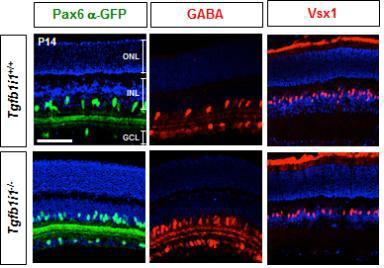Scientists discover retina cell related to light sensitivity
By KH디지털2Published : Feb. 20, 2017 - 14:34
A group of South Korean medical scientists has discovered a retina cell that responds to light, the science ministry said Monday, a finding that could potentially help the sight of people suffering from severe sensitivity to light.
The team led by Kim Jin-woo from the Korea Advanced Institute of Science and Technology discovered that visual responses are sensitive to the overall composition of retinal interneurons called amacrine cells, the Ministry of Science, ICT and Future Planning said.

The retina is a light-sensitive layer of tissue that lines the inside of the eye that is comprised of a variety of different nerve cells. Together, these cells process incoming light and then trigger electrical signals that travel to the brain, where they are translated into an image.
The team's research paper said, "A protein known as Tgfb1i1 interacts with two transcription factors to form a 'complex' that binds to the alpha-enhancer and blocks the production of a particular form of Pax6. In experiments performed in mice, the loss of Tgfb1i1 led to increased production of this form of Pax6, which resulted in the retina containing more of a certain type of amacrine cell that produces a molecule called GABA."
"This research is meaningful as we discovered that light sensitivity is controlled by small change in a particular retina cell," said Kim.
The ministry said it will use the findings as a reference for future studies to improve the sight of people working in dark environments or those suffering from severe light sensitivity. (Yonhap)





![[K-pop’s dilemma] Can K-pop break free from ‘fandom’ model?](http://res.heraldm.com/phpwas/restmb_idxmake.php?idx=644&simg=/content/image/2024/05/09/20240509050541_0.jpg&u=20240509173751)




![[News Analysis] Yoon's first 2 years marked by intense confrontations, lack of leadership](http://res.heraldm.com/phpwas/restmb_idxmake.php?idx=644&simg=/content/image/2024/05/09/20240509050612_0.jpg&u=20240509233252)







![[Today’s K-pop] NCT’s Mark to drop 1st solo album in February 2025](http://res.heraldm.com/phpwas/restmb_idxmake.php?idx=642&simg=/content/image/2024/05/10/20240510050597_0.jpg&u=)